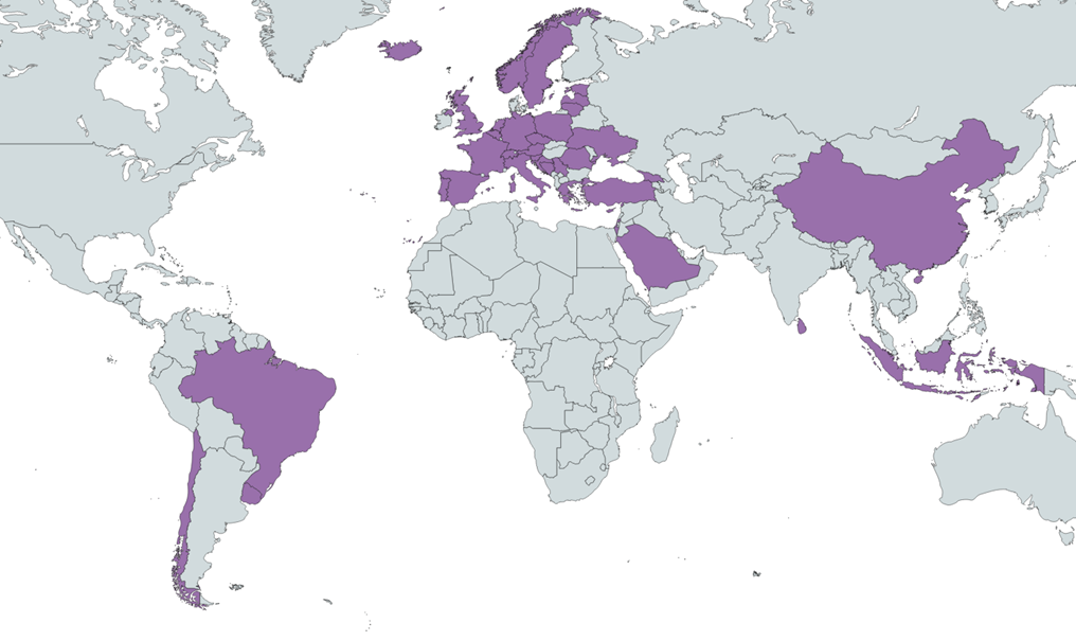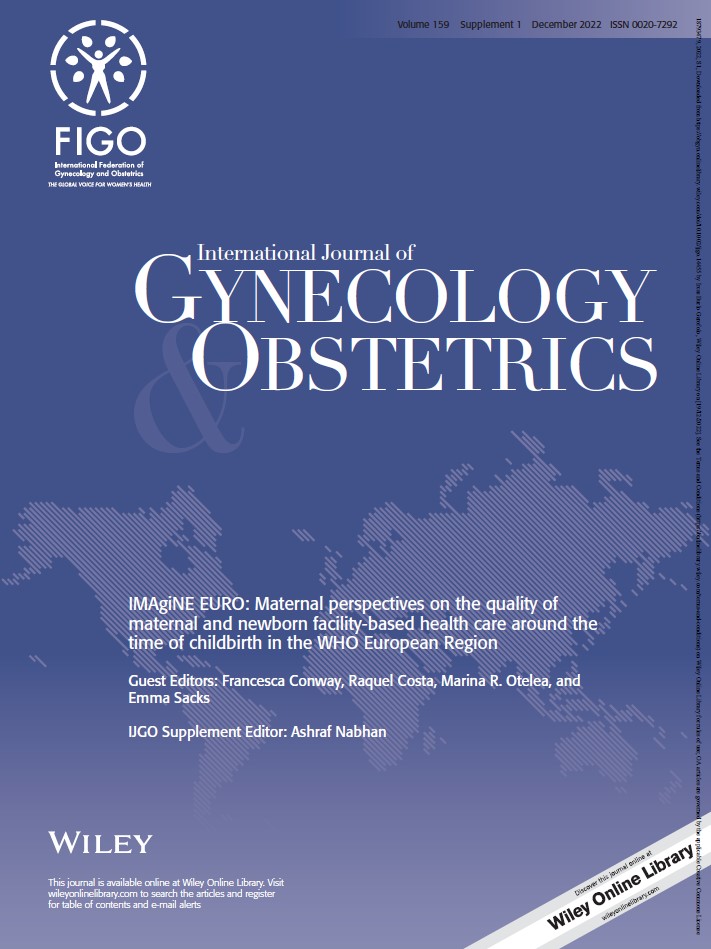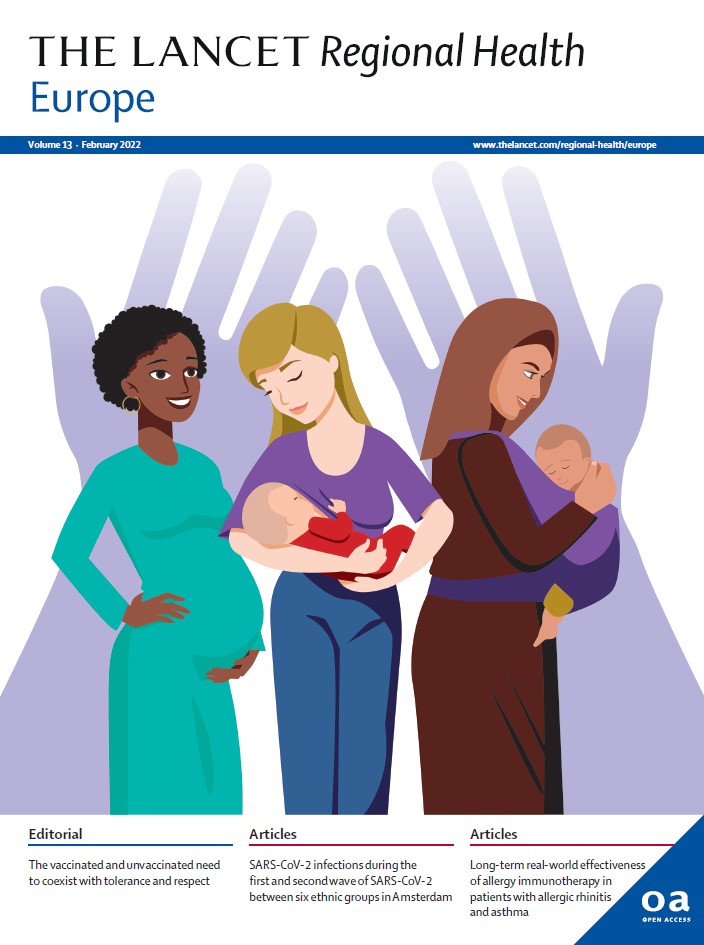-
Responsabile: MD PhD Marzia Lazzerini
Online survey on the preparedness, quality and resilience of the maternal and newborn health service among countries of the WHO European Region during and after the COVID-19 pandemic emergency.
The survey is based on WHO Standards to improve the quality of maternal and newborn hospital care (please, find here the WHO standards)

IMAgiNE EURO, coordinated by the WHO Collaborating center of the IRCCS Burlo Garofolo Trieste is a project based on an network of more than 10 countries. It includes two online surveys (one for mothers, the other for health workers) to explore maternal and newborn health service preparedness, quality and resilience, among countries of the WHO European Region, at different phases of the COVID-19 pandemic. We hope it will help us to understand the views and experiences of women giving birth, as well as health workers involved in maternal and newborn care. We will share the findings to help others to provide quality services. You can have a look at our initial findings and reports here.
For MOTHERS: Did you gave birth in a hospital after 1st March 2020? TELL US YOUR EXPERIENCE HERE
under construction
| Italian | Croatian | Hindi | Serbian |
| Arabic | English | Norwegian | Slovenian |
| Albanian | Russian | Polish | Spanish |
| Bosnian | French | Portuguese | Bengali |
| Chinese | German | Romanian | Swedish |
| Catalan | Nepalese | Hebrew | Latvian |
| Greek | Lithuanian | Dutch | Ukrainian |
| Georgian | Indonesian | ||
For HEALTHCARE PROFESSIONALS: Are you a healthcare professional directly involved in maternal/neonatal care at facility level during the COVID-19 pandemic? Take part in the survey: your opinion matters!
under construction
| Italian | Croatian | Bosnian | Lithuanian |
| German | English | Norwegian | Slovenian |
| Russian | French | Polish | Spanish |
| Latvian | Romanian | Portuguese | Swedish |
| Greek | |||
Insights:
Special issue published open access in IJGO (the official journal of FIGO), dedicated to our IMAgiNE EURO Project, which since the beginning of the pandemic has collected data on approximately 70,000 women on the quality of maternal and neonatal care in 22 countries in the WHO European Region.
The project highlights major inequalities between countries (and also within individual countries) in the quality of maternal and neonatal care.
The supplement consists of 12 articles, with two editorials written by colleagues from WHO, UNICEF, LSHTM, and the presidents of FIGO, ICM, in addition to human rights associations.

IMAgiNE EURO supports the WHO campaign Wordl Health Day 2025: Healthy beginnings, hopeful futures
IMAgiNE EURO Dissemination events: Living document [link]
IMAgiNE EURO Partners' List: Living document [link]
IMAgiNE EURO Publications:
1. Lazzerini M, Covi B, Mariani I, Drglin Z, Arendt M, Nedberg IH, Elden H, Costa R, Drandić D, Radetić J, Otelea MR, Miani C, Brigidi S, Rozée V, Ponikvar BM, Tasch B, Kongslien S, Linden K, Barata C, Kurbanović M, Ružičić J, Batram-Zantvoort S, Castañeda LM, Rochebrochard E, Bohinec A, Vik ES, Zaigham M, Santos T, Wandschneider L, Viver AC, Ćerimagić A, Sacks E, Valente EP; IMAgiNE EURO study group. Quality of facility-based maternal and newborn care around the time of childbirth during the COVID-19 pandemic: online survey investigating maternal perspectives in 12 countries of the WHO European Region. Lancet Reg Health Eur. 2022 Feb;13:100268. doi: 10.1016/j.lanepe.2021.100268. Epub 2021 Dec 24. Erratum in: Lancet Reg Health Eur. 2022 Jul 22;19:100461. doi: 10.1016/j.lanepe.2022.100461. PMID: 34977838; PMCID: PMC8703114.https://pubmed.ncbi.nlm.nih.gov/34977838/
2. Zaigham M, Linden K, Sengpiel V, Mariani I, Valente EP, Covi B, Lazzerini M, Elden H; IMAgiNE EURO Study Group. Large gaps in the quality of healthcare experienced by Swedish mothers during the COVID-19 pandemic: A cross-sectional study based on WHO standards. Women Birth. 2022 Nov;35(6):619-627. doi: 10.1016/j.wombi.2022.01.007. Epub 2022 Jan 24. PMID: 35123922; PMCID: PMC8784577. https://pubmed.ncbi.nlm.nih.gov/35123922/
3. Lazzerini M, Covi B, Mariani I, Giusti A, Pessa Valente E; IMAgiNE EURO Study Group. Quality of care at childbirth: Findings of IMAgiNE EURO in Italy during the first year of the COVID-19 pandemic. Int J Gynaecol Obstet. 2022 May;157(2):405-417. doi: 10.1002/ijgo.14119. Epub 2022 Feb 20. PMID: 35092692; PMCID: PMC9087757. https://pubmed.ncbi.nlm.nih.gov/35092692/
4. Lazzerini M, Argentini G, Mariani I, Covi B, Semenzato C, Lincetto O, Muzigaba M, Valente EP. WHO standards-based tool to measure women's views on the quality of care around the time of childbirth at facility level in the WHO European region: development and validation in Italy. BMJ Open. 2022 Feb 16;12(2):e048195. doi: 10.1136/bmjopen-2020-048195. PMID: 35172991; PMCID: PMC8852667. https://pubmed.ncbi.nlm.nih.gov/35172991/
5. Valente EP, Covi B, Mariani I, Morano S, Otalea M, Nanu I, Nanu MI, Elden H, Linden K, Zaigham M, Vik ES, Kongslien S, Nedberg I, Costa R, Rodrigues C, Dias H, Drandić D, Kurbanović M, Sacks E, Muzigaba M, Lincetto O, Lazzerini M; IMAgiNE EURO Study Group. WHO Standards-based questionnaire to measure health workers' perspective on the quality of care around the time of childbirth in the WHO European region: development and mixed-methods validation in six countries. BMJ Open. 2022 Apr 8;12(4):e056753. doi: 10.1136/bmjopen-2021-056753. PMID: 35396296; PMCID: PMC8995570. https://pubmed.ncbi.nlm.nih.gov/35396296/
6. Lazzerini M, Costa R, Mariani I, Vik ES, Elden H, Linden K, Zaigham M, Liepinaitienė A, Arendt M, Drglin Z, Sacks E, Lincetto O, Valente EP; IMAgiNE EURO Study Group. Science and beyond science in the reporting of quality of facility-based maternal and newborn care during the COVID-19 pandemic-Authors' reply. Lancet Reg Health Eur. 2022 Sep;20:100488. doi: 10.1016/j.lanepe.2022.100488. Epub 2022 Aug 18. PMID: 35996590; PMCID: PMC9386305. https://pubmed.ncbi.nlm.nih.gov/35996590/
7. Costa R, Rodrigues C, Dias H, Covi B, Mariani I, Valente EP, Zaigham M, Vik ES, Grylka-Baeschlin S, Arendt M, Santos T, Wandschneider L, Drglin Z, Drandić D, Radetic J, Rozée V, Elden H, Mueller AN, Barata C, Miani C, Bohinec A, Ruzicic J, de La Rochebrochard E, Linden K, Geremia S, de Labrusse C, Batram-Zantvoort S, Ponikvar BM, Sacks E, Lazzerini M; IMAgiNE EURO study group. Quality of maternal and newborn care around the time of childbirth for migrant versus nonmigrant women during the COVID-19 pandemic: Results of the IMAgiNE EURO study in 11 countries of the WHO European region. Int J Gynaecol Obstet. 2022 Dec;159 Suppl 1(Suppl 1):39-53. doi: 10.1002/ijgo.14472. PMID: 36530012; PMCID: PMC9877819. https://pubmed.ncbi.nlm.nih.gov/36530012/
8. Otelea MR, Simionescu AA, Mariani I, Valente EP, Nanu MI, Nanu I, Handra CM, Covi B, Lazzerini M; IMAgiNE EURO Study Group. Women's assessment of the quality of hospital-based perinatal care by mode of birth in Romania during the COVID-19 pandemic: Results from the IMAgiNE EURO study. Int J Gynaecol Obstet. 2022 Dec;159 Suppl 1(Suppl 1):126-136. doi: 10.1002/ijgo.14482. PMID: 36530009; PMCID: PMC9877960. https://pubmed.ncbi.nlm.nih.gov/36530009/
9. Miani C, Wandschneider L, Batram-Zantvoort S, Covi B, Elden H, Nedberg IH, Drglin Z, Pumpure E, Costa R, Rozée V, Otelea MR, Drandić D, Radetic J, Abderhalden-Zellweger A, Ćerimagić A, Arendt M, Mariani I, Linden K, Ponikvar BM, Jakovicka D, Dias H, Ruzicic J, de Labrusse C, Valente EP, Zaigham M, Bohinec A, Rezeberga D, Barata C, Pfund A, Sacks E, Lazzerini M; IMAgiNE EURO study group. Individual and country-level variables associated with the medicalization of birth: Multilevel analyses of IMAgiNE EURO data from 15 countries in the WHO European region. Int J Gynaecol Obstet. 2022 Dec;159 Suppl 1:9-21. doi: 10.1002/ijgo.14459. PMID: 36530006. https://pubmed.ncbi.nlm.nih.gov/36530006/
10. Drandić D, Drglin Z, Mihevc Ponikvar B, Bohinec A, Ćerimagić A, Radetić J, Ružičić J, Kurbanović M, Covi B, Valente EP, Mariani I, Lazzerini M; IMAgiNE EURO study group. Women's perspectives on the quality of hospital maternal and newborn care around the time of childbirth during the COVID-19 pandemic: Results from the IMAgiNE EURO study in Slovenia, Croatia, Serbia, and Bosnia-Herzegovina. Int J Gynaecol Obstet. 2022 Dec;159 Suppl 1(Suppl 1):54-69. doi: 10.1002/ijgo.14457. PMID: 36530003; PMCID: PMC9877897. https://pubmed.ncbi.nlm.nih.gov/36530003/
11. Pumpure E, Jakovicka D, Mariani I, Vaska A, Covi B, Valente EP, Jansone-Šantare G, Knoka AR, Vilcāne KP, Rezeberga D, Lazzerini M; IMAgiNE EURO study group. Women's perspectives on the quality of maternal and newborn care in childbirth during the COVID-19 pandemic in Latvia: Results from the IMAgiNE EURO study on 40 WHO standards-based quality measures. Int J Gynaecol Obstet. 2022 Dec;159 Suppl 1(Suppl 1):97-112. doi: 10.1002/ijgo.14461. PMID: 36530013; PMCID: PMC9878132. https://pubmed.ncbi.nlm.nih.gov/36530013/
12. Arendt M, Tasch B, Conway F, Lecomte A, Covi B, Mariani I, Valente EP, Lazzerini M; IMAgiNE EURO study group. Quality of maternal and newborn care around the time of childbirth in Luxembourg during the COVID-19 pandemic: Results of the IMAgiNE EURO study. Int J Gynaecol Obstet. 2022 Dec;159 Suppl 1(Suppl 1):113-125. doi: 10.1002/ijgo.14473. PMID: 36530011; PMCID: PMC9877667. https://pubmed.ncbi.nlm.nih.gov/36530011/
13. Lazzerini M, Valente EP, Covi B, Rozée V, Costa R, Otelea MR, Abderhalden-Zellweger A, Węgrzynowska M, Linden K, Arendt M, Brigidi S, Miani C, Pumpure E, Radetic J, Drandic D, Cerimagic A, Nedberg IH, Liepinaitienė A, Rodrigues C, de Labrusse C, Baranowska B, Zaigham M, Castañeda LM, Batram-Zantvoort S, Jakovicka D, Ruzicic J, Juciūtė S, Santos T, Gemperle M, Tataj-Puzyna U, Elden H, Mizgaitienė M, Lincetto O, Sacks E, Mariani I; IMAgiNE EURO study group. Rates of instrumental vaginal birth and cesarean and quality of maternal and newborn health care in private versus public facilities: Results of the IMAgiNE EURO study in 16 countries. Int J Gynaecol Obstet. 2022 Dec;159 Suppl 1(Suppl 1):22-38. doi: 10.1002/ijgo.14458. PMID: 36530007; PMCID: PMC10108180. https://pubmed.ncbi.nlm.nih.gov/36530007/
14. Nedberg IH, Vik ES, Kongslien S, Mariani I, Valente EP, Covi B, Lazzerini M; IMAgiNE EURO study group. Quality of health care around the time of childbirth during the COVID-19 pandemic: Results from the IMAgiNE EURO study in Norway and trends over time. Int J Gynaecol Obstet. 2022 Dec;159 Suppl 1(Suppl 1):85-96. doi: 10.1002/ijgo.14460. PMID: 36530008; PMCID: PMC9877678. https://pubmed.ncbi.nlm.nih.gov/36530008/
15. Costa R, Barata C, Dias H, Rodrigues C, Santos T, Mariani I, Covi B, Valente EP, Lazzerini M; IMAgiNE EURO study group. Regional differences in the quality of maternal and neonatal care during the COVID-19 pandemic in Portugal: Results from the IMAgiNE EURO study. Int J Gynaecol Obstet. 2022 Dec;159 Suppl 1(Suppl 1):137-153. doi: 10.1002/ijgo.14507. PMID: 36530002; PMCID: PMC9878220. https://pubmed.ncbi.nlm.nih.gov/36530002/
16. de Labrusse C, Abderhalden-Zellweger A, Mariani I, Pfund A, Gemperle M, Grylka-Baeschlin S, Mueller AN, Valente EP, Covi B, Lazzerini M; IMAgiNE EURO study group. Quality of maternal and newborn care in Switzerland during the COVID-19 pandemic: A cross-sectional study based on WHO quality standards. Int J Gynaecol Obstet. 2022 Dec;159 Suppl 1(Suppl 1):70-84. doi: 10.1002/ijgo.14456. PMID: 36530005; PMCID: PMC9877813. https://pubmed.ncbi.nlm.nih.gov/36530005/
17. Chertok IA, Artzi-Medvedik R, Arendt M, Sacks E, Otelea MR, Rodrigues C, Costa R, Linden K, Zaigham M, Elden H, Drandic D, Grylka-Baeschlin S, Miani C, Valente EP, Covi B, Lazzerini M, Mariani I. Factors associated with exclusive breastfeeding at discharge during the COVID-19 pandemic in 17 WHO European Region countries. Int Breastfeed J. 2022 Dec 2;17(1):83. doi: 10.1186/s13006-022-00517-1. PMID: 36461061; PMCID: PMC9716162. https://pubmed.ncbi.nlm.nih.gov/36461061/
18. Batram-Zantvoort S, Alaze A, Lazzerini M, Pessa Valente E, Mariani I, Covi B, Miani C. Verletzte Geburtsintegrität während der COVID-19-Pandemie in Deutschland: Erfahrungen von Gebärenden mit der geburtshilflichen Versorgung [Violated birth integrity during the COVID-19 pandemic in Germany: experiences of women with maternity care]. Bundesgesundheitsblatt Gesundheitsforschung Gesundheitsschutz. 2023 Mar;66(3):302-311. German. doi: 10.1007/s00103-023-03667-7. Epub 2023 Feb 8. PMID: 36752819; PMCID: PMC9906577. https://pubmed.ncbi.nlm.nih.gov/36752819/
19. Vik ES, Kongslien S, Nedberg IH, Mariani I, Valente EP, Covi B, Lazzerini M. Women's experiences and views on early breastfeeding during the COVID-19 pandemic in Norway: quantitative and qualitative findings from the IMAgiNE EURO study. Int Breastfeed J. 2023 Mar 10;18(1):15. doi: 10.1186/s13006-023-00553-5. PMID: 36895002; PMCID: PMC9998246. https://pubmed.ncbi.nlm.nih.gov/36895002/
20. Geremia S, Valente EP, Mariani I, Dalena P, Lazzerini M. Women's suggestions on how to improve the quality of maternal and newborn care during the COVID-19 pandemic in Italy: A co-occurrence network analysis. J Glob Health. 2023 May 5;13:06013. doi: 10.7189/jogh.13.06013. PMID: 37144478; PMCID: PMC10161149. https://pubmed.ncbi.nlm.nih.gov/37144478/
21. Artzi-Medvedik R, Mariani I, Valente EP, Lazzerini M, Chertok IA. Factors associated with exclusive breastfeeding in Israel during the COVID-19 pandemic: a subset of the IMAgiNE EURO cross-sectional study. Int Breastfeed J. 2023 Jun 9;18(1):30. doi: 10.1186/s13006-023-00568-y. PMID: 37296409; PMCID: PMC10250857. https://pubmed.ncbi.nlm.nih.gov/37296409/
22. Knoka, A. R., Pumpure, E., Matroze, A., Jakovicka, D., Mariani, I., Vaska, A., . . . Lazzerini, M. (2024). Importance of Quality of Maternal and Newborn Care in Childbirth: Findings Over Time of the Imagine Euro Study on 40 WHO Standard-Based Quality Measures During the COVID-19 Pandemic in Latvia. Proceedings of the Latvian Academy of Sciences. Section B. Natural, Exact, and Applied Sciences., 78(1), 35-43. doi:10.2478/prolas-2024-0006 https://sciendo.com/it/article/10.2478/prolas-2024-0006
23. Abderhalden-Zellweger A, de Labrusse C, Gemperle M, Grylka-Baeschlin S, Pfund A, Mueller AN, Mariani I, Pessa Valente E, Lazzerini M. Women's experiences of disrespect and abuse in Swiss facilities during the COVID-19 pandemic: a qualitative analysis of an open-ended question in the IMAgiNE EURO study. BMC Pregnancy Childbirth. 2024 May 31;24(1):402. doi: 10.1186/s12884-024-06598-6. PMID: 38822258; PMCID: PMC11143635. https://pubmed.ncbi.nlm.nih.gov/38822258/
24. Valente EP, Mariani I, Bomben A, Morano S, Gemperle M, Otelea MR, Miani C, Elden H, Sarantaki A, Costa R, Baranowska B, König-Bachmann M, Kongslien S, Drandić D, Rozée V, Nespoli A, Abderhalden-Zellweger A, Nanu I, Batram-Zantvoort S, Linden K, Metallinou D, Dias H, Tataj-Puzyna U, D'Costa E, Nedberg IH, Kurbanović M, de La Rochebrochard E, Fumagalli S, Grylka-Baeschlin S, Handra CM, Zaigham M, Orovou E, Barata C, Szlendak B, Zenzmaier C, Vik ES, Liepinaitienė A, Drglin Z, Arendt M, Sacks E, Lazzerini M; Improving MAternal Newborn carE in the EURO Region (IMAgiNE EURO) Study Group. Health workers' perspectives on the quality of maternal and newborn health care around the time of childbirth: Results of the Improving MAternal Newborn carE in the EURO Region (IMAgiNE EURO) project in 12 countries of the World Health Organization European Region. J Glob Health. 2024 Sep 6;14:04164. doi: 10.7189/jogh.14.04164. PMID: 39238363; PMCID: PMC11377968. https://pubmed.ncbi.nlm.nih.gov/39238363/
25. Zaigham M, Linden K, Elden H, Delle Vedove S, Mariani I, Kongslien S, Drandić D, Pumpure E, Drglin Z, Costa R, Sarantaki A, de Labrusse C, Miani C, Oțelea MR, Liepinaitienė A, Baranowska B, Rozée V, Valente EP, Vik ES, Kurbanović M, Jakovicka D, Bohinec A, Dias H, Metallinou D, Mueller AN, Batram-Zantvoort S, Handra CM, Mizgaitienė M, Tataj-Puzyna U, Bomben A, Nedberg IH, Voitehoviča E, Pinto TM, Lykeridou A, Grylka-Baeschlin S, Jazdauskienė S, Szlendak B, Sacks E, Lazzerini M; IMAgiNE EURO Study group. Trends in the quality of maternal and neonatal care in Sweden and Norway as compared to 12 WHO European countries: A cross-sectional survey investigating maternal perspectives during the COVID-19 pandemic. Acta Obstet Gynecol Scand. 2024 Dec;103(12):2485-2498. doi: 10.1111/aogs.14994. Epub 2024 Oct 21. PMID: 39431577; PMCID: PMC11610009. https://pubmed.ncbi.nlm.nih.gov/39431577/
26. Fumagalli S, Nespoli A, Iannuzzi L, Mariani I, Valente EP, Lazzerini M. Women's suggestions on how to improve the quality of maternal and newborn care: A qualitative analysis from the IMAgiNE EURO survey in Italy during the two years of the COVID-19 pandemic. Eur J Midwifery. 2024 Oct 22;8. doi: 10.18332/ejm/192143. PMID: 39439544; PMCID: PMC11494818. https://pubmed.ncbi.nlm.nih.gov/39439544/
27. Grylka-Baeschlin S, Gemperle M, Mariani I, Abderhalden-Zellweger A, Miani C, Zenzmaier C, Mueller AN, Batram-Zantvoort S, Koenig-Bachmann M, De Labrusse C, Arendt M, Vedove SD, Pfund A, Simon I, Valente EP, Lazzerini M; IMAgiNE Euro Study Group. Women 's perception on the quality of maternal and newborn care during the COVID-19 pandemic in German-speaking countries: Findings from the IMAgiNE EURO project comparing data from Germany, Switzerland and Austria. Midwifery. 2025 Jan;140:104209. doi: 10.1016/j.midw.2024.104209. Epub 2024 Oct 11. PMID: 39423767. https://pubmed.ncbi.nlm.nih.gov/39423767/
28. Galle A, Berghman H, D'Hauwers S, Vaerewijck N, Valente EP, Mariani I, Bomben A, Delle Vedove S, Lazzerini M; IMAgiNE EURO Study Group. Quality of care at childbirth during the COVID-19 pandemic in Belgium: a cross-sectional study based on WHO standards. BMJ Open. 2024 Dec 27;14(12):e086937. doi: 10.1136/bmjopen-2024-086937. https://pubmed.ncbi.nlm.nih.gov/39732493/
29. Batram-Zantvoort S, Miani C, Mariani I, Valente EP, Zaigham M, Nedberg IH, Kurbanović M, Pumpure E, Bohinec A, Sarantaki A, Baranowska B, Abderhalden-Zellweger A, de La Rochebrochard E, Costa R, Otelea MR, Liepinaitienė A, Radetic J, Ćerimagić A, Arendt M, König-Bachmann M, Vedove SD, Linden K, Kongslien S, Drandić D, Kreslina D, Drglin Z, Metallinou D, Tataj-Puzyna U, Gemperle M, Rozée V, Dias H, Mizgaitienė M, Ruzicic J, Simon I, Fumagalli S, Elden H, Vik ES, Ponikvar BM, Lykeridou A, Szlendak B, de Labrusse C, Pinto TM, Jazdauskienė S, Zenzmaier C, Chertok I, Sacks E, Lazzerini M; IMAgiNE EURO Study group. The Association Between Women's Perception of Birth During the Pandemic, Companion of Choice and Support From Health Professionals: A Cross-Sectional Study in 20 Countries in the WHO European Region. Birth. 2025 Apr 4. doi: 10.1111/birt.12915. Epub ahead of print. PMID: 40183500. https://pubmed.ncbi.nlm.nih.gov/40183500/
30. Galle, A., Berghman, H., Mariani, I., Verdecchia, M., Bomben, A., Vik, E. S., Drandic, D., Pumpure, E., Costa, R., Elden, H., Miani, C., Baranowska, B., Sarantaki, A., Drglin, Z., Radetic, J., Liepinaitienė, A., Rozée, V., Abderhalden-Zellweger, A., Cerimagic, A., König-Bachmann, M., … IMagiNE EURO study group (2025). Experiences of disrespect and abuse during childbirth in the World Health Organization European region: A mixed-method study among 22 countries. International journal of gynaecology and obstetrics: the official organ of the International Federation of Gynaecology and Obstetrics, 10.1002/ijgo.70516. Advance online publication. https://doi.org/10.1002/ijgo.70516
31. Mariani I, Covi B, Pessa Valente E, Lazzara G, Not S, Casetta G, Manfrida MM, Bua J, Piazza M, Zanetti A, Moretti V, Giornelli R, Battistin S, Miani MP, Pecci L, Pizzocchero E, Fabiani C, Michelutti A, Pertner V, Saretta F, Maccor S, Mognato E, Kaur J, Bertelloni A, Massaro M, Loisotto K, Franzin C, Lazzerini M, on behalf of IMAgiNE Friuli Venezia Giulia Study GroupFrequency of reported abuse, stigma and discrimination during facility-based childbirth among migrant mothers and their suggestions for improvement: a mixed method WHO Standards-based multicenter study in Italy. Accepted for pubblication on BMJ Open. 29 September 2025.



